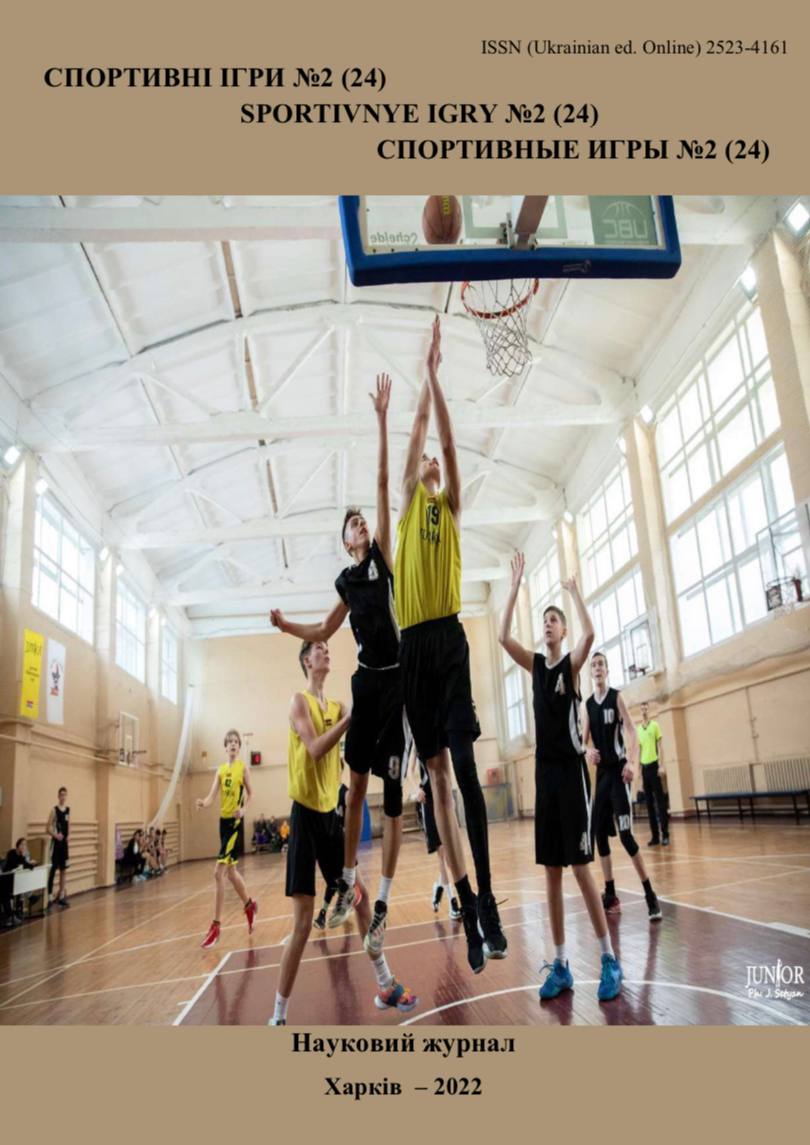Емоційний інтелект як ресурс конкурентоспроможності у спортивній ігровій діяльності
DOI:
https://doi.org/10.15391/si.2022-2.9Ключові слова:
емоційний інтелект, конкурентоспроможність, спортивна ігрова діяльність, спортсмени, змаганняАнотація
У цій статті наведено результати теоретичного аналізу проблеми емоційного інтелекту як ресурсу конкурентоспроможності спортсменів у спортивній ігровій діяльності. Актуальність дослідження обумовлюється тим, що сучасний спорт вищих досягнень характеризується високими фізичними та психологічними навантаженнями, спрямованістю на досягнення максимально високих результатів,
жорсткою конкуренцією суперників. Емоційний інтелект розглядається як психологічний феномен, який досліджується за допомогою різних ідей, теорій, концепцій, категорій: емоції, почуття та переживання, емоційний стан, емоційно-вольова регуляція, емоційна зрілість особистості (Ф. Василюк, В. Вілюнас, К. Ізард, Є. Ільїн, Г. Орме, О. Саннікова, О. Чебикін, П. Екман); емоційний інтелект, емоційно-соціальний інтелект, емоційна компетентність (R. Bar-on, Д. Гоулман, J. Mayer, P. Salovey); емоційна стійкість, надійність, регуляція, які забезпечують конкурентоспроможність спортсменів в процесі змагань (Р. Агавелян, Г. Горська, Н. Ільясова, С. Кас’янова, В. Пірожкова). Мета статті – проаналізувати сучасні психологічні уявлення про природу емоційного інтелекту як ресурсу конкурентоспроможності у спортивній ігровій діяльності. Методи дослідження: аналіз, порівняння, систематизація, узагальнення сучасних наукових джерел та результатів емпіричних досліджень психологічного змісту досліджуваної проблеми. Результати дослідження показали важливість розвитку емоційного інтелекту спортсменів для забезпечення їх конкурентоспроможності у змагальній діяльності, однак враховуючи неоднорідність результатів теоретичних та емпіричних досліджень, є потреба подальших наукових досліджень цієї проблеми. Висновки полягають у тому, що специфіка спортивної ігрової діяльності потребує розвитку емоційного інтелекту та всіх його складових для зниження ситуативної тривожності спортсменів перед змаганнями і навіть підвищення їх конкурентоспроможності.
Посилання
Андреева, И.Н. (2012). Азбука эмоционального интеллекта. СПб. : БХВ-Петербургю Бар-Он, Р. (2009). Эмоциональный интеллект: описание. Журнал практического психолога, 3, 37-45.
Василюк, Ф.Е. (2007). Понимающая психотерапия как психотехническая система. Московская психологическая школа: История и современность, 4, 45-61.
Вилюнас, В.К. (2004). Психология эмоций. СПб.: Питер.
Горская, Г.Б. (2012). Организационный стресс в спорте: источники, специфика проявлений, направления исследований. Физическая культура, спорт - наука и практика, 4, 74-76.
Гоулман, Д. (2009). Эмоциональный интеллект; [пер. с англ. А.П. Исаевой]. М.: АСТ; Владимир: ВКТ.
Гоулман, Д. (2021). Емоційний інтелект у бізнесі. Харків : Vivat.
Изард, К.Э. (2012). Психология эмоций. СПб.: Питер.
Ильин, Е.П. (2001). Эмоции и чувства. СПб.: Издательство Питер.
Илясова, Н.В., & Агавелян, Р.О. (2014). Особенности эмоционального интеллекта спортсменов индивидуальных и командных видов спорта. Проблемы современной науки и образования, 11 (29), 105-108.
Кас’янова, С.Б. (2018). Особливості впливу емоційного інтелекту на особистісні ресурси подолання складних життєвих ситуацій. Вісник ОНУ імені І.І. Мечникова. Серія «Психологія», Т. 23, 2 (48), 49-57.
Книш, А.Є. (2016). Емоційний інтелект лідера у сфері бізнесу: навчальний посібник. Київ: ДП «НВЦ» Пріоритети».
Льошенко, О. (2010). Емоційний інтелект та емоційна компетентність: проблеми співвідношення. Вісник КНУ імені Т. Шевченка. Психологія. Педагогіка. Соціальна робота, 2, 49-52.
Носенко, Е.Л. (2016). Емоційний інтелект як чинник досягнення життєвого успіху: монографія. Київ: Освіта України.
Орме, Г. (2003). Эмоциональное мышление как инструмент достижения успеха. М.: КСП+.
Пирожкова, В.О. (2015). Психологические предпосылки эмоциональной устойчивости высококвалифицированных спортсменов в условиях соревновательного стресса. Актуальные вопросы физической культуры и спорта, 17, 93-98.
Санникова, О.П. (1995). Эмоциональность в структуре личности. Одесса: Хорс.
Стернберг, Р., Форсайт, Дж. Б., & Хедланд, Дж. (2002). Практический интеллект. СПб.: Питер.
Хекхаузен, Х. (1986). Мотивация и деятельность. в 2-х томах. М.: Педагогика,. Т. 1.
Чернявська, Т.П. (2021). Самоефективність як предиктор успішності професійної діяльності.
Fundamental and applied researches in practice of leading scientific schools journal homepage: http://farplss.org doi: 10.33531/farplss. 2021.2.6. Volume 44, 2, 44-47.
Чебикін, О.Я., & Павлова, І.Г. (2009). Становлення емоційної зрілості особистості: монографія. Півд. Наук. центр АПН України. О.: СВД Черкасов.
Четверик-Бурчак, А.Г. (2013). Емоційний інтелект як чинник успішності вирішення головних життєвих завдань. Психолінгвістика, 14, 163-184.
Экман, П. (2016). Психология эмоций. СПб.: Издательство Питер.
Bar-On, R. (1997). Emotional Intelligence Inventory (EQ-I): Technical Manual. Toronto, Canada: Multi-Health Systems.
Jeff Gallimore Dr. Stephen Burke (2005). Athletic burnout. Sport Exercise Psychology. Australian Catholic University. School of Human Movement (NSW). Sydney, Australia, 41-52.
Mayer, J.D., Salovey, P., Caruso, D. (2004). Emotional intelligence: Theory, Findings, and Implications. Psychological Inquiry, V. 15, 3, 197-215.











